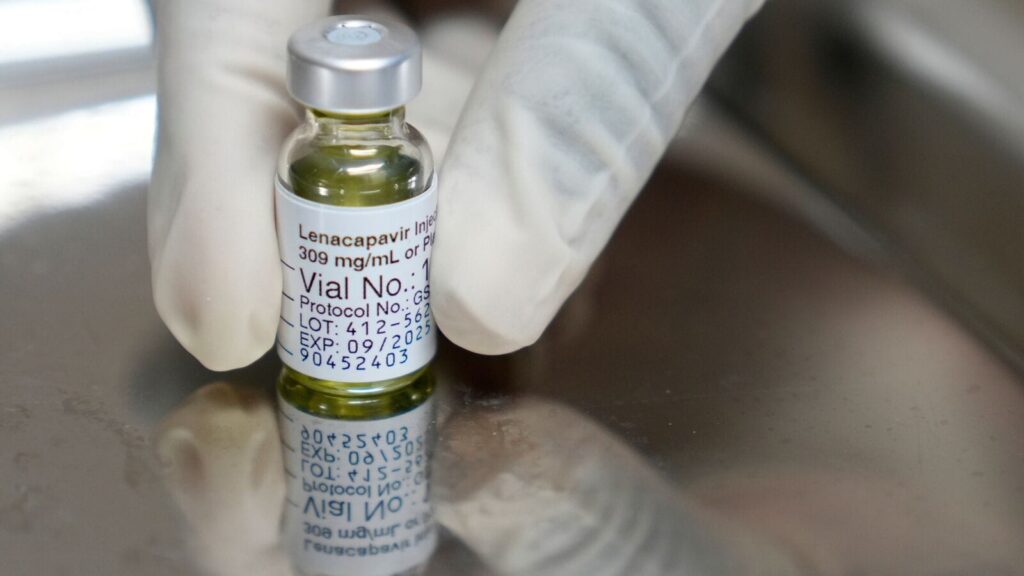American biopharmaceutical major Gilead Sciences, has recieved approval from the United States’ Food and Drug Administration (US FDA), for its bi-annual HIV prevention injection, to be marketed as ‘Yeztugo’.
Gilead shares briefly jumped 3.5 per cent — its biggest gain nearly a month, and rose 17 per cent year-on-year (YoY), till market close on June 18, Bloomberg reported. The stock outperforming a 2 per cent increase in the S&P 500 index.
Lenacapavir, marketed under the brand name Yeztugo, has been shown to reduce the risk of HIV transmission by more than 99.9 percent in adults and adolescents — making it functionally akin to a powerful vaccine, according to an AFP report.
‘A way to end the HIV epidemic’, says Gilead CEO
Hailed by activists as the world’s “best tool” to fight the HIV virus, especially since no vaccine is yet available, the medicine has to be administered only twice a year and are compatible for a wide range of people, as per the report.
“This is a milestone moment in the decades-long fight against HIV. We now have a way to end the HIV epidemic,” Gilead CEO Daniel O’Day said in an emailed statement to Bloomberg.
The injection demonstrated “powerful ability” to ward off HIV infection in two major international studies last year, the BB report added. AFP reported that results from both trials were published in The New England Journal of Medicine, and the journal Science named lenacapavir its 2024 “Breakthrough of the Year”.
As many as 1.3 million people are infected with the HIV virus each year, with the highest rate in Africa. Daily pills do work, but can be forgotten by patients or also lead to stigma as the bottle can reveal people’s health status.
What is the success rate of Yeztugo in trials?
One international study published in November 2024 showed that the drug prevented all but two HIV cases among 2,180 men and transgender people — a rate 96 per cent lower than the background incidence level in that population.
And in June 2025, Gilead said a trial of the shot in 2,000 women and adolescent girls in sub-Saharan Africa prevented an “unprecedented” 100 per cent of HIV cases.
It also outperformed the company’s old HIV prevention daily oral pill Truvada in both studies.
Are there any side effects to Gilead’s Yeztugo?
Yes, there are some side effects. Around 1.2 per cent of the people in the study had reactions at the injection site and stopped taking the medicine, the Bloomberg report said.
Other reported side effects include headache, and nausea, according to the AFP report.
How much does Yeztugo cost?
Gilead said it will price Yeztugo at $28,218 per year (around ₹24.50 lakh), compared to the $26,400 list price of its daily HIV prevention pill, Descovy. There was no specific price given for India or other global markets.
Lenacapavir’s current list price for its previously approved use as a treatment for HIV is $39,000 annually, the AFP report noted.
“We are working to make Yeztugo accessible for anyone who needs or wants it and expect to see broad insurance coverage,” Gilead spokeswoman Blair Baumwell told AFP via email.
The jab will compete with GSK-arm ViiV Healthcare’s Apretude prevention shot, which is administered alternate months. This jab costs ₹15,200 for a 600mg/3ml vial, according to data on IndiaMart.
Notably, Gilead already sells the same drug, lenacapavir, as a treatment for people with multidrug-resistant HIV under the brand Sunlenca — priced at ₹23000/box for 300 mg tablets in India, according to IndiaMart.
Where will the jab be available?
The California-based company is looking at making the drug a “best-seller” in rich countries, but will also be pushed toward faster roll-out in poorer and middle-income countries that face HIV crisis. And analysts surveyed by Bloomberg expect Yeztugo sales to surpass $4 billion per year by 2031.
The report added that Gilead has already filed for approval in a number of countries, including Australia, Brazil, Canada, the European Union, South Africa, and the EU Medicines For All program, which helps speed the review of drugs that will be used in developing countries.
Distribution to lower income countries to be impacted by Donald Trump’s federal cuts?
In October, Gilead signed agreements with six pharma companies to produce and distribute generic versions of the drug in around 120 low-income and middle-income countries, pending regulatory approval, AFP reported.
In a separate deal in December, Gilead announced partnership with the United Nations’ Global Fund, the US President’s Emergency Plan for AIDS Relief (PEPFAR), and others, to purchase doses for two million people. However, Donald Trump’s cuts to the PEPFAR program could now impact this development.
(With inputs from Bloomberg, AFP)

